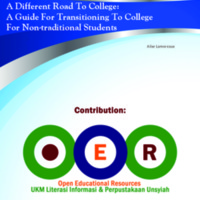A Different Road To College A Guide For Transitioning To College For Non-traditional Students
Dublin Core
Subject
Description
A Different Road To College: A Guide For Transitioning Non-Traditional Students is designed to introduce students to the contextual issues of college. Non-traditional students have an ever-growing presence on college campuses, especially community colleges. This open educational resource is designed to engage students in seeing themselves as college students and understanding the complexity of what that means to their lives.
Non-traditional students face critical issues surrounding participation and success in college. These critical issues include, but are not limited to, the following
Strategies for managing competing needs on their time
Difficulty navigating institutional environments
Understanding the culture of college
Transitional services not in place to the same degree as for “traditional” students
Knowledgeable support systems
Personal barriers
Unpredictable influences on their schedules
Work first, study second priorities
Paying for college
Underprepared foundation skills (Reading, Writing, Math, Computer Literacy, Human Relations, Oral Communication).
Most textbooks available on the topic of college transition/success today focus on the traditional 18-year old student and the needs of someone living away from home for the first time.The goal of the book is to help students understand how to select the right college for them and then become acquainted with the inner workings and language of college. The book is designed to be a practical guide for first-generation college students as they navigate potentially unfamiliar topics such as understanding the costs of college beyond tuition, navigating college websites, and defining critical language needed to understand communication regarding the context and culture of the college.
Non-traditional students face critical issues surrounding participation and success in college. These critical issues include, but are not limited to, the following
Strategies for managing competing needs on their time
Difficulty navigating institutional environments
Understanding the culture of college
Transitional services not in place to the same degree as for “traditional” students
Knowledgeable support systems
Personal barriers
Unpredictable influences on their schedules
Work first, study second priorities
Paying for college
Underprepared foundation skills (Reading, Writing, Math, Computer Literacy, Human Relations, Oral Communication).
Most textbooks available on the topic of college transition/success today focus on the traditional 18-year old student and the needs of someone living away from home for the first time.The goal of the book is to help students understand how to select the right college for them and then become acquainted with the inner workings and language of college. The book is designed to be a practical guide for first-generation college students as they navigate potentially unfamiliar topics such as understanding the costs of college beyond tuition, navigating college websites, and defining critical language needed to understand communication regarding the context and culture of the college.
Creator
Publisher
Contributor
Cut Rita Zahara
Rights
Creative Commons
Type
Files
Collection
Citation
Alise Lamoreaux, “A Different Road To College A Guide For Transitioning To College For Non-traditional Students,” Open Educational Resources (OER) , accessed June 24, 2025, https://oer.uinsyahada.ac.id/items/show/643.


